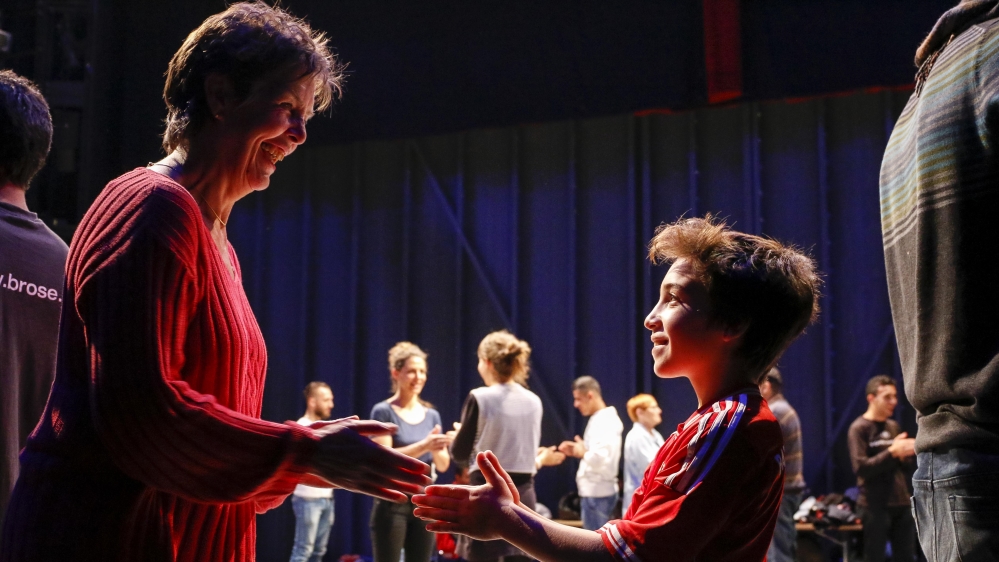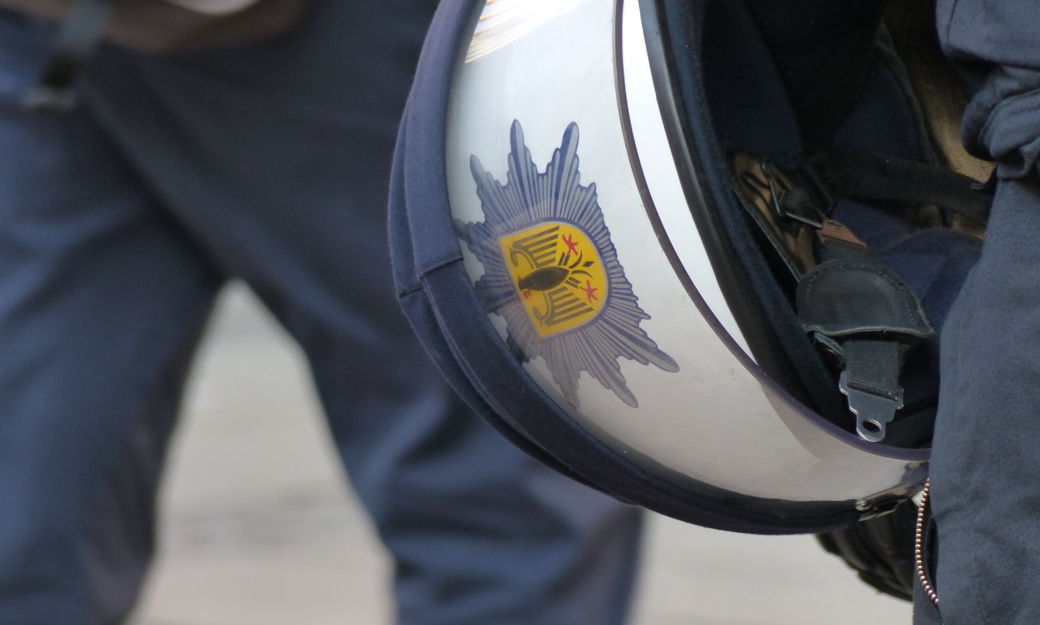A look inside the imagination of the nation’s leading anti-immigrant party in Berlin.
Read: NOEMA Mag
A look inside the imagination of the nation’s leading anti-immigrant party in Berlin.
Read: NOEMA Mag
Read: Crime Reads
Hans-Georg Maassen has a troubling relationship with the far-right—just like the agency he used to head.
Read: Foreign Policy
One overcast day in Berlin in May 2016, a conversation about informants threw my career down an eight-year-long detour.
Read: The Dial

By Jacob Kushner
Coming May 2024 by Grand Central (Hachette); Harper Collins UK
Not long after the Berlin Wall fell, three teenagers became friends in the East German town of Jena. It was a time of excitement, but also of economic crisis: some four million East Germans found themselves out of jobs. The friends began attending far-right rallies with people who called themselves National Socialists: Nazis. Like the Hitler-led Nazis before them, they blamed minorities for their ills. From 2000 to 2011, they embarked on the most horrific string of white nationalist killings since the Holocaust. Their target: immigrants.
Look Away follows Beate Zschäpe and her two accomplices—and sometimes lovers—as they radicalized within Germany’s far-right scene, escaped into hiding, and carried out their terrorist spree. Unable to believe that the brutal killings and bombings were being carried out by white Germans, police blamed—and sometimes framed—the immigrants instead. Readers meet Gamze Kubaşık, whose family emigrated from Turkey to seek safety, only to find themselves in the terrorists’ sights. It also tracks Katharina König, an Antifa punk who would help expose the NSU and their accomplices to the world. A masterwork of reporting and storytelling, Look Away reveals how a group of young Germans carried out a shocking spree of white supremacist violence, and how a nation and its government ignored them until it was too late.
“Jacob Kushner’s Look Away is, at one level, a compelling true-crime thriller about a trio of German terrorists on the run. But it’s also a warning about the dangers of white supremacy and right-wing extremism – and about how the fear and hatred of immigrants, combined with the incompetence (or worse) of law enforcement, remains a threat around the world.” — Jeffrey Toobin, New York Times bestselling author of Homegrown: Timothy McVeigh and the Rise of Right-Wing Extremism
“Exceedingly well-written and deeply reported—a fascinating and disturbing book.” —Peter Bergen, author of The Rise and Fall of Osama Bin Laden
“With a novelist’s skills for drama and scene, Kushner shows the dangers of complacency in the face of gathering violence. Such terrible truths, so deftly told, remind us why we should not—and cannot afford to—look away.” —Kim Cross, NYT bestselling author of In Light of All Darkness and What Stands in a Storm
“A searing and infuriating read about a nation still grappling with the ghosts of its past.” —Joshua Hammer, author of The Falcon Thief
“Jacob Kushner’s Look Away is a damning account of a problem seen in the U.S. and around the world: how law enforcement’s obsession with informants can blind them to real threats of domestic terror.” —Trevor Aaronson, author of The Terror Factory
“Jacob Kushner is a masterful storyteller who never loses sight of the humanity of his story’s immigrant victims and their families. An important and urgent book.” —Julia Lee, author of Biting the Hand
“Discomfiting as it is meticulously researched, Look Away is not just a terrifying window into revived German extremism but a warning to the world—a reminder that, at the end of the day, violent racial authoritarianism knows no borders.” —Jonathan M. Katz, author of Gangsters of Capitalism
“This expertly reported story of three friends who committed unspeakable hate crimes is a cautionary tale about ignoring the lessons of history and realities of the present.” —Seyward Darby, author of Sisters in Hate
“This fascinating book tells two stories: first, how a gang of East German thugs turned neo-Nazi ‘bomb tinkerers’ grew into a network of domestic terrorists, and second, how German authorities let them get away with murder. Jacob Kushner tells the story with cautious condemnation and intimate detail.” —Michael Scott Moore, author of The Desert and the Sea
“Kushner’s natural, commanding voice recalls the classic nonfiction writers John Hersey and William Langewiesche, and the depth of his reporting is only exceeded by the streamlined, engrossing way he tells his story–a story about the questions that lie at the heart of politics in so many societies: what is “terror” and who are its real victims?” —Eve Fairbanks, author of The Inheritors
“Jacob Kushner’s Look Away has the pacing and taut prose of a crime thriller while also managing to be a smart and thorough analysis of right-wing extremism in Germany.” —Alexander Stille, author of The Sullivanians
“Timely, chilling, and unforgettable, Look Away is an urgent warning that willful blindness about the present is as pernicious as failure to reckon with the past. A must-read for anyone concerned about the rise of far-right extremism.” —Becky Cooper, bestselling author of We Keep the Dead Close
About the author:

Jacob Kushner is a foreign correspondent who writes magazine and other longform articles from Africa, Germany, and the Caribbean. His writing has appeared in dozens of publications including the New York Times, The Atlantic, Harper’s, The New Yorker, VQR, The Economist, National Geographic, The Atavist, Foreign Policy and The Guardian. He is the author of China’s Congo Plan, which was favorably reviewed in the New York Review of Books. A Fulbright-Germany scholar and Logan Nonfiction Fellow, he was a finalist for the Livingston Award in International Reporting. He regularly does speaking engagements with ambitious young, internationally-minded journalists at The Overseas Press Club, The Pulitzer Center, and several universities.
For publicity, speaking, or media inquiries: Roxanne Jones (HBG USA)
Literary and film representation: Elias Altman (Massie & McQuilkin)
By Jacob Kushner
Coming May 2024 by Harper Collins UK
Not long after the Berlin Wall fell, three teenagers became friends in the East German town of Jena. It was a time of excitement, but also of economic crisis: some four million East Germans found themselves out of jobs. The friends began attending far-right rallies with people who called themselves National Socialists: Nazis. Like the Hitler-led Nazis before them, they blamed minorities for their ills. From 2000 to 2011, they embarked on the most horrific string of white nationalist killings since the Holocaust. Their target: immigrants.
Look Away/White Terror follows Beate Zschäpe and her two accomplices—and sometimes lovers—as they radicalized within Germany’s far-right scene, escaped into hiding, and carried out their terrorist spree. Unable to believe that the brutal killings and bombings were being carried out by white Germans, police blamed—and sometimes framed—the immigrants instead. Readers meet Gamze Kubaşık, whose family emigrated from Turkey to seek safety, only to find themselves in the terrorists’ sights. It also tracks Katharina König, an Antifa punk who would help expose the NSU and their accomplices to the world. A masterwork of reporting and storytelling, Look Away reveals how a group of young Germans carried out a shocking spree of white supremacist violence, and how a nation and its government ignored them until it was too late.
“Jacob Kushner’s White Terror is a shocking story of serial killers, twisted idealism and a country that looked away. With impeccable research and a spellbinding narrative Kushner takes us into a dark heart of extremism and the moral murk of what passes for liberal democracy. For anyone who cares about shared humanity and the rule of law, this is a wake-up call.” —Rory Carroll, author of There Will Be Fire / Killing Thatcher
“Jacob Kushner’s White Terror is, at one level, a compelling true-crime thriller about a trio of German terrorists on the run. But it’s also a warning about the dangers of white supremacy and right-wing extremism – and about how the fear and hatred of immigrants, combined with the incompetence (or worse) of law enforcement, remains a threat around the world.” — Jeffrey Toobin, New York Times bestselling author of Homegrown: Timothy McVeigh and the Rise of Right-Wing Extremism
“Exceedingly well-written and deeply reported—a fascinating and disturbing book.” —Peter Bergen, author of The Rise and Fall of Osama Bin Laden
“With a novelist’s skills for drama and scene, Kushner shows the dangers of complacency in the face of gathering violence. Such terrible truths, so deftly told, remind us why we should not—and cannot afford to—look away.”
—Kim Cross, NYT bestselling author of In Light of All Darkness and What Stands in a Storm
“A searing and infuriating read about a nation still grappling with the ghosts of its past.” —Joshua Hammer, author of The Falcon Thief
“Jacob Kushner’s White Terror is a damning account of a problem seen in the U.S. and around the world: how law enforcement’s obsession with informants can blind them to real threats of domestic terror.” —Trevor Aaronson, author of The Terror Factory
“Jacob Kushner is a masterful storyteller who never loses sight of the humanity of his story’s immigrant victims and their families. An important and urgent book.” —Julia Lee, author of Biting the Hand
“Discomfiting as it is meticulously researched, White Terror is not just a terrifying window into revived German extremism but a warning to the world—a reminder that, at the end of the day, violent racial authoritarianism knows no borders.” —Jonathan M. Katz, author of Gangsters of Capitalism
“This expertly reported story of three friends who committed unspeakable hate crimes is a cautionary tale about ignoring the lessons of history and realities of the present.” —Seyward Darby, author of Sisters in Hate
“This fascinating book tells two stories: first, how a gang of East German thugs turned neo-Nazi ‘bomb tinkerers’ grew into a network of domestic terrorists, and second, how German authorities let them get away with murder. Jacob Kushner tells the story with cautious condemnation and intimate detail.” —Michael Scott Moore, author of The Desert and the Sea
“Kushner’s natural, commanding voice recalls the classic nonfiction writers John Hersey and William Langewiesche, and the depth of his reporting is only exceeded by the streamlined, engrossing way he tells his story–a story about the questions that lie at the heart of politics in so many societies: what is “terror” and who are its real victims?” —Eve Fairbanks, author of The Inheritors
“Jacob Kushner’s White Terror has the pacing and taut prose of a crime thriller while also managing to be a smart and thorough analysis of right-wing extremism in Germany.” —Alexander Stille, author of The Sullivanians
“Timely, chilling, and unforgettable, White Terror is an urgent warning that willful blindness about the present is as pernicious as failure to reckon with the past. A must-read for anyone concerned about the rise of far-right extremism.” —Becky Cooper, bestselling author of We Keep the Dead Close
“This staggering account from journalist Kushner connects the dots between Germany’s far-right movement and a string of terror attacks from 2001 to 2010…Readers will be shocked and dismayed.”—Publishers Weekly (starred review)
German authorities looked the other way as a right-wing terrorist cell went on a seven-year killing spree. Now they won’t look in the mirror.
Read: Foreign Policy Magazine
As featured on Longform

If restitution advocates have their way, Berlin’s new Humboldt Forum may mark the beginning of the end of an era in which western museums served as humble custodians of other peoples’ things.
“Hermann Baumann wasn’t yet a Nazi when he set sail to Angola in search of Chokwe treasure.”
Read the full feature story: Tortoise

Refugee youth partake in the international cafe’s theatre activities and perform skits based on their own experiences [Daniel Koch/Staatsschauspiel Dresden]
Here, immigrants tell stories about their homelands and laugh with German volunteers about cultural differences. Graffiti covers the walls, a sign on one wall reads, “Refugees welcome. Bring your families.”
They do. Children play table football, while teenagers – mostly boys – lounge on couches.
But this particular space, known as the “international cafe”, rests in an uncanny location.
Dresden, the capital of Saxony, is a stronghold for Germany’s anti-immigrant politics. Each week, thousands of supporters of the right-wing, anti-Muslim, anti-refugee movement PEGIDA gather to demonstrate against Germany’s liberal policies towards asylum seekers.
They chant that refugees should “go home” and denounce what they see as the Islamisation of Germany. Refugees often take care to avoid central Dresden on Monday nights out of fear they’ll become targets of the protesters’ angry speech, or worse.
Read the full story at Al Jazeera. This is the final story in a 7-part series.

Jacob Kushner for Al Jazeera
A lawyer and his family fled death threats in Pakistan and came to Germany only to face terrorism. Now, they’re being forced to go home.
Salzhemmendorf, Germany – Late one summer night in this quiet village, a Molotov cocktail came flying through the window of the apartment where a Zimbabwean refugee and her three young children lived.
In the apartment next door, an asylum seeker from Pakistan who calls himself Mr Khan heard nothing. He was sitting at his computer with his headphones on, watching videos on the internet with news from Karachi. He and his family had fled Pakistan for Europe in 2012 after some of his colleagues – lawyers who were Shia Muslim – had been murdered by Sunni Islamic extremists.
When he heard a loud banging on his apartment door, he opened it to find a police officer, who ushered him and his family outside. The building smelled of smoke, and Khan surveyed the wreckage: The Molotov cocktail had destroyed the bedroom it was thrown into. It was the room in which the woman’s 11-year-old son usually slept on a mattress on the floor. By chance, he was sleeping in his mother’s room that night, which may have saved his life.
Outside, “I heard the sound of the fire brigade,” Khan said. “If they did not come, this whole building could have been finished.”
After Khan’s building was attacked by xenophobic Germans, he wondered whether Germany would accept their asylum applications, and allow them to stay.
“Tomorrow, I don’t know what will happen,” Khan said. “Maybe Germany will say, ‘Out!'”
In fact, it did.
Read the full story at Al Jazeera. This is the 6th article in a 7-part series.

Photo by Journalistenwatch, flikr.
Last week I wrote about an attack on a refugee housing complex in Altenburg, Germany, in which two baby carriages were set aflame. It occurred just two days after members of a right-wing, anti-immigrant movement called PEGIDA marched through the town. That piece grappled with the question of how Germany—a nation with an unparalleled record of confronting its past—has found itself once again home to a small but active collection of xenophobes willing to resort to hate speech or even violence against newly arrived refugees.
But what is Germany doing to protect asylum seekers from right-wing terrorism? In 2015, the newspaper Die Zeit counted 220 violent attacks against refugees but only four convictions. Last year, the number of attacks (including ones that did not result in violence) exploded to 3,500.
How to stop this proliferation? Read the full piece at Columbia Global Reports.

Photo by Arnaud333, Wikimedia Commons.
On December 7, 2015, two baby carriages were set on fire at an apartment complex housing refugees in the pristine Thuringia town of Altenburg. Ten refugees, including two infants, suffered from smoke inhalation. The attack came two days after right-wing protesters marched through the town carrying signs that read, “Please continue your flight. There’s nowhere to live here.”
“On the ground floor there was a woman living with her baby who had to jump out without shoes,” district administrator Michaele Sojka told me when I met her last June. “Everyone was really shocked that something like that could happen in our city.
Two men were arrested, and six months later one of them was found guilty of arson. The judge said the man had “acted on xenophobic motives.” The other was handed a fine for repeating Nazi slogans. “One of them must have been drunk that night,” Brit Krostewitz, a volunteer with the Altenburg Network for Integration, told me. “They are just stupid Nazis.” Most Germans know the type.
This is Germany, a country whose leaders just 80 years ago tried to deport and then exterminate all non-Christians and “outsiders.” A country so ashamed of its xenophobic past that to display any hint of nationalism, such as to wave a German flag during a soccer match, remained taboo. Germany, a liberal European state that goes so far as to limit speech—by criminalizing Holocaust denial—least anyone attempt to forget or manipulate that torrid past.
And yet, Germany has recently become a breeding ground for small pockets of xenophobic citizens to commit hate crimes and terrorism against foreigners.
Read the full story at Columbia Global Reports. This is the first part of a short series on refugees in Germany.

Illustration by Jawahir Al-Naimi/Al Jazeera
In Freital, Abu Hamid and his fellow refugees were attacked by right-wing Germans, who could be convicted of terrorism.
Freital, Germany – On Halloween night, 2015, in this town outside the Saxon capital of Dresden, Abu Hamid went into the kitchen to grab some food when he noticed sparks of light outside the window. Sensing danger, he and his roommates rushed out of the kitchen just as a booming explosion shook the house, shattering the windows and sending pieces of glass into one man’s face.
“After that, we thought someone would come inside the home and attack us,” Abu Hamid said. “One of my friends, he took a knife.”
The explosion was caused by illegal fireworks, as they later discovered. It appeared someone had placed them on the windowsill that night to target those inside. For months beforehand, local police had failed to see a connection between a series of right-wing protests against refugee housing shelters and the bombing of a car belonging to a left-wing politician in Freital. Just one month before Abu Hamid’s apartment was attacked, another, almost identical firework attack had been launched on the house of some Eritrean refugees in the town.
It wasn’t until news outlets as far away as Berlin began pressuring authorities to take action that Germany’s federal prosecutor took up the case. In a dramatic SWAT-style raid, federal and state police arrested five suspects believed to have formed an organised anti-refugee militia.
Read the full story at Al Jazeera. This is the fifth story in a seven-part series.

A police car is parked in front of an asylum shelter in Clausnitz in March 2016 [Hannibal Hanschke/Reuters]
Once the face of anti-refugee sentiment in Germany, Clausnitz and its newcomers have learned to co-exist.
On a cold night last year, some 70 Germans, mostly men, surrounded a bus of refugees in this small town and began chanting at them to “go home”.
It was February 2016, and nearly one million asylum seekers had arrived the previous year to Germany from the Middle East, Africa and elsewhere. As they waited to see if they’d be allowed to stay, they were sent off to live in different cities and towns across the country.
One bus with 15 asylum seekers from Syria, Lebanon, Iran and Afghanistan was sent one evening to the village of Clausnitz, in the eastern German state of Saxony.

Their hostile reception by protesters who shouted at them and blocked them from entering their apartments made international headlines. A video of the encounter circulated widely, reinforcing stereotypes of small-town Germans as racist and blemishing Germany’s so-called “welcome culture”.
The refugees pleaded to the driver to turn around and return them to the temporary shelters they’d been living in around Dresden, the Saxon capital. Neither the refugees nor the demonstrators wanted this. But then, neither had a choice.
Read the full story at Al Jazeera. This is the 4th story in a 7-part series.